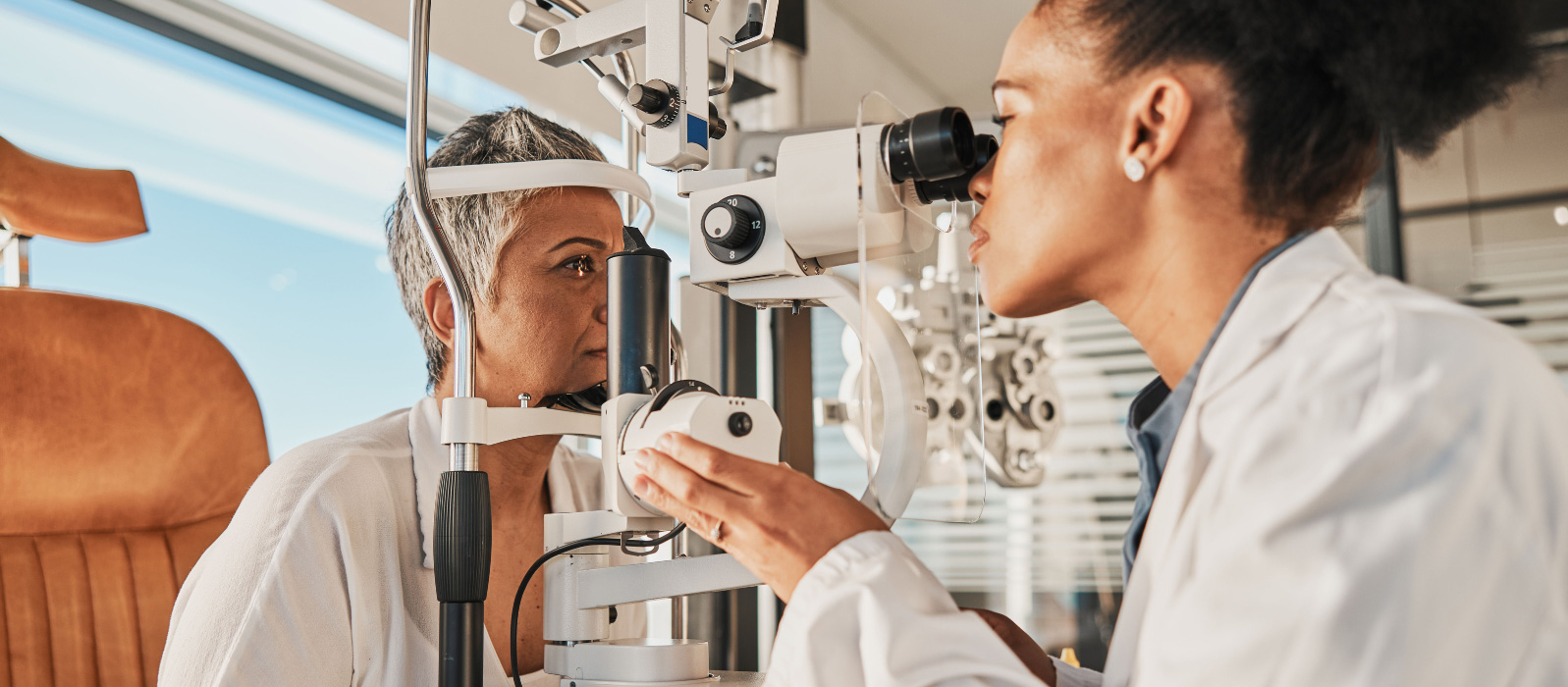
Many people think their eyesight is fine without realizing they may need glasses or contact lenses. According to the CDC, approximately 11 million Americans over the age of 12 need vision correction. Regular eye exams are an important part of finding eye diseases early to protect your vision.
Eye Exams
Unfortunately, eye diseases are common and can go unnoticed for a long time. Some eye problems do not have any symptoms in their early stages. A comprehensive dilated eye exam by an eye doctor can find eye disease in the early stages. Treatment to prevent vision loss is most effective during the early stages. Though people tend to have more vision problems as they get older, children need eye exams too. According to the CDC, less than half of preschool children have had their vision tested to check for eye disease. Children’s eyes should be checked regularly by an eye doctor or pediatrician. The US Preventive Services Task Force recommends that children have at least one eye exam between age 3 and 5 years.
If you are having an active problem, do not wait for your next appointment. Inform your eye doctor so they can treat you appropriately. You should see your eye doctor as soon as possible if you have decreased vision, draining or redness of the eye, eye pain, double vision, floaters, circles (halos) around lights, or flashes of light. Only half of people at high risk for vision loss visit an eye doctor every year. Regular eye care can have a life-changing impact on preserving the vision of millions of people.
Common Eye Diseases
Early treatment is critically important to prevent vision loss or blindness from common eye problems such as cataracts, diabetic retinopathy, glaucoma, and age-related macular degeneration. Cataracts can cause clouding of the eye lens and are the leading cause of vision loss in the USA. It is most common in older people but can also affect younger people. Diabetic retinopathy causes damage to blood vessels in the back of the eye. It is also the leading cause of blindness in American adults. Glaucoma is a group of
diseases that damages the optic nerve. It can be open or closed angle. Open glaucoma progresses slowly, while closed glaucoma can come on quickly and painfully. Age-related macular degeneration causes the gradual breakdown of light-sensitive tissue in the eye. It destroys sharp and central vision.
Amblyopia is also known as the lazy eye; this condition occurs when vision does not develop normally in one eye. Strabismus is also known as crossed eye; it can occur when the eyes are not properly aligned. Other common eye problems include refractive errors like astigmatism, farsightedness, and nearsightedness. Some people even experience dry eyes, floaters, color blindness, and pink eye.
8 Warning Signs of Serious Eye Problems
Serious eye problems often do not cause any pain. Here are 8 warning signs that should not be ignored:
- Sudden blurry or distorted vision – Sudden blurry vision can affect either your peripheral vision or your central vision and can be a sign of many very serious eye conditions.
- Swelling on or around the eye – Inflammation and irritation of the eyelids and the tissues surrounding the eye can cause the eye to swell and become discolored. It can also be caused by trauma anywhere on the head, face, or neck, or from a mild to severe allergic reaction.
- Headaches – Headaches can feel different depending on what is causing them. If your regular headache medication is not working and the pain persists or worsens contact a healthcare provider.
- Red eyes – When your eyes become irritated or inflamed, the blood vessels expand, causing the white parts of your eyes to appear pink or red. This can be caused by a number of factors including allergies, smoke, and pollutants in the air around you.
- Oversensitivity to light – When the eyes are unable to cope with the amount of incoming light, it causes what is known as photophobia, or light sensitivity.
- Floaters – Little lines, dots, specks, and webs that seem to float around in your vision, especially when you are looking at plain or blank objects, such as a white wall. If you experience a sudden onset of floaters or more floaters than you are accustomed to you should contact your eye doctor immediately.
- Night blindness – Some serious eye conditions limit the eye’s ability to take in this light or to process it, making it difficult to see at night or in dimly lit environments.
- Flashes – Sudden flashes in your vision can be common as you age, as this usually happens as a result of vitreous fluid tugging or rubbing on the retina, at the back of your eye.
Eye Disease Treatment
Eye disease treatments can vary even more than the conditions they treat. Eye disease treatments depend on the type and severity of the disease. Treatment may include prescription glasses or contacts, medications, eye drops, laser treatments, or surgery.
Glasses or contacts help to correct nearsightedness, farsightedness, and astigmatism. Refractive surgery corrects refractive errors, such as with LASIK. Corrective lenses help to treat nearsightedness, farsightedness, astigmatism, corneal scarring, aphakia, and keratoconus.
Surgery involves cataract surgery that removes a cloudy lens and replaces it with a clear lens implant. Glaucoma surgery is used to treat glaucoma. LASIK is a laser-based surgery that can correct nearsightedness, farsightedness, and astigmatism. Refractive surgery is used to correct refractive errors.
Medications involve eye drops, antibiotics, and immunosuppressive medicines. Eye drops for eye diseases can treat a variety of conditions including glaucoma, dry eyes, and bacterial infections. Some of the eye drops include prostaglandin analogs, alphaadrenergic agonists, beta blockers, carbonic anhydrase inhibitors. Treatment for dry eyes includes artificial tears, Xiidra, lubricants with oil-based ingredients, lubricants with hypotonic or hyperosmolar ingredients. Treatment for bacterial infections include antibiotic eye drops that kill bacteria that cause infections.
Preventing Eye Disease
Some eye diseases are completely preventable, and you can at least reduce your risk of developing others. Some eye diseases can happen unpredictably, making it almost impossible to prevent or lower your odd of having them. Some general steps you can take to help maintain your eye health:
- Get regular eye exams – Everyone should get an eye exam at least every 1-2 years.
- Wear eye protection – Injuries to your eyes, face, or head can cause long-term eye issues and damage. Wearing eye protection specifically meant for that purpose can prevent eye injuries or make them less severe.
- Avoid nicotine use – Smoking, vaping, and smokeless tobacco usage can all affect your circulatory system.
- Do not ignore infections – Eye infections that go untreated for too long can become bigger issues and cause lasting damage or other complications.
- Do not ignore eye symptoms – Gradual vision changes are a sign that you need to see an eye doctor for an eye exam. Sudden, unexpected vision changes, especially vision loss, are medical emergencies that need immediate care.
- Make proper nutrition a priority – You eyes need specific vitamins and minerals to do their best.
- Reach and maintain a weight that is healthy for you – Your overall health can have a big impact on eye health. You eye doctor or primary care provider can guide you on the best ways to manage your overall health for the benefit of your eyes.
Conclusion
It is vitally important that you have a routine eye exam every 1-2 years, unless you have eye disease. Your vision could be related to other health conditions such as diabetes and high blood pressure. Catching these conditions and eye diseases early is key to the best possible treatment with better outcomes. Treatments for eye disease depends on type and severity of disease. And when in doubt, call out. Call your eye doctor today to setup an appointment!
All research and clinical material published by Hilb Group is for informational purposes only. Readers are encouraged to confirm the information contained herein with other sources. Patients and consumers should review the information carefully with their professional healthcare provider. The information is not intended to replace medical advice offered by physicians. ©2025 Hilb Group
